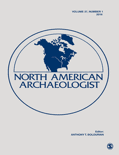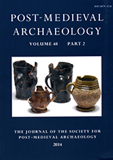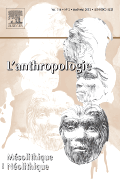
Origini
Scope & Guideline
Exploring the Depths of History Through Research.
Introduction
Aims and Scopes
- Archaeological Methodologies:
'Origini' showcases diverse archaeological methods, including field surveys, excavations, and advanced techniques such as geophysical prospection and stable isotope analysis to investigate ancient sites. - Material Culture Studies:
The journal emphasizes the analysis of material remains such as pottery, tools, and architectural structures to understand cultural practices, trade networks, and social organization in prehistoric societies. - Socioeconomic Dynamics:
Research often delves into the socio-economic interactions of ancient communities, exploring themes like trade, subsistence strategies, and social hierarchy through archaeological evidence. - Regional Interaction and Connectivity:
A significant focus is placed on the interactions between different regions, investigating how cultural and economic exchanges shaped the development of societies across time and space. - Cultural Symbolism and Interpretation:
The journal explores the symbolic meanings behind artifacts and architecture, contributing to discussions on identity, belief systems, and cultural continuity or change throughout history.
Trending and Emerging
- Interdisciplinary Approaches:
There is a growing trend towards integrating diverse fields such as environmental science, anthropology, and technology in archaeological research, aiming to provide holistic insights into ancient societies. - Regionalism and Interaction Networks:
Recent publications increasingly emphasize the concept of regionalism and the examination of interaction networks, showcasing how ancient communities were interconnected through trade and cultural exchanges. - Digital Archaeology and Technological Innovations:
The incorporation of digital methods and technologies, including GIS and 3D modeling, is becoming more prominent, enabling researchers to analyze and present archaeological data in innovative ways. - Chronological Frameworks and Climate Impact:
Emerging themes include the examination of chronological frameworks in relation to climate events, exploring how environmental changes influenced human behavior and settlement patterns. - Symbolic and Identity Studies:
There is a notable increase in research focusing on the symbolic aspects of artifacts and their implications for understanding identity, belief systems, and cultural narratives in ancient societies.
Declining or Waning
- Paleoethnobotany:
While earlier publications included significant studies on plant remains and their implications for understanding ancient diets and agriculture, this theme has become less prevalent in recent issues. - Cannibalism and Violence Studies:
Although initial research focused on the darker aspects of human behavior in prehistoric contexts, such as cannibalism and interpersonal violence, recent articles have shifted towards broader socio-cultural dynamics, leading to a decrease in this specific focus. - Localized Case Studies:
There appears to be a waning interest in highly localized case studies that focus solely on single sites or artifacts without broader regional or comparative implications, as the journal increasingly favors studies that emphasize interconnectedness.
Similar Journals

JOURNAL OF WORLD PREHISTORY
Illuminating the Path of Archaeological ScholarshipJOURNAL OF WORLD PREHISTORY, published by SPRINGER, stands as a premier platform for disseminating pioneering research and scholarship in the field of archaeology. Boasting a prestigious Q1 status in Archeology and a remarkable 97th percentile ranking in its category, this journal has made significant contributions to the understanding of global prehistory since its inception in 1987. It serves as an invaluable resource for researchers, professionals, and students alike, providing access to high-quality articles that explore diverse archaeological methodologies, theoretical frameworks, and case studies. Although it is not an open-access journal, its impact and relevance continue to resonate within the academic community, fostering critical discussions and advancing knowledge in this vital discipline. With publications converging from 2006 and set to continue until 2024, the JOURNAL OF WORLD PREHISTORY remains committed to advancing archaeological research and enhancing interdisciplinary collaboration.

Britannia
Connecting Scholars to the Rich Tapestry of HistoryBrittannia is a prestigious journal published by Cambridge University Press that serves as a cornerstone for scholars and enthusiasts in the fields of Archaeology, Classics, and History. With its ISSN of 0068-113X and E-ISSN of 1753-5352, the journal has been committed to disseminating high-quality research and innovative studies since its inception in 1970, addressing vital topics that span cultural, historical, and archaeological dimensions. As a hallmark of academic rigor, it maintains a Q1 ranking in Classics and History and a Q2 ranking in Archaeology (both Arts and Humanities, 2023), reflecting its impact and significance in these disciplines. Although not an Open Access journal, it provides invaluable content for researchers, professionals, and students alike, ensuring that vital insights into ancient civilizations and cultural heritage resonate well beyond the pages of each issue. With upcoming publications scheduled through 2024, Brittannia continues to be an essential resource for anyone invested in the legacies of the past.

NORTH AMERICAN ARCHAEOLOGIST
Illuminating History Through Rigorous ResearchNORTH AMERICAN ARCHAEOLOGIST, published by SAGE PUBLICATIONS INC, is a prestigious journal that serves as an essential resource for professionals and scholars in the field of archaeology. With its ISSN 0197-6931 and E-ISSN 1541-3543, the journal aims to disseminate high-quality research that contributes to the understanding of the historical and cultural significance of North America from prehistory to the present. As of 2023, it holds an impressive Q2 category in Archaeology and ranks within the Q1 tier for Archaeology (arts and humanities), positioning it among the top journals in its field. Its Scopus rankings further emphasize its significance, reflecting a commendable percentile standing that underscores its influence in both arts and humanities and social sciences. The journal is committed to offering a platform for innovative research and scholarly discussion, making it invaluable for researchers, professionals, and students dedicated to advancing archaeological knowledge.

Studijne Zvesti Archeologickeho Ustavu Slovenskej Akademie Vied
Advancing archaeological knowledge, one study at a time.Studijne Zvesti Archeologickeho Ustavu Slovenskej Akademie Vied is a leading journal in the field of archaeology, published by the SLOVENSKA AKAD VIED, ARCHEOLOGICKY USTAV, based in Nitra, Slovakia. This esteemed journal, with the ISSN 0560-2793, has established itself as a vital resource for scholars and researchers, reflecting significant academic contributions in both the arts and humanities as well as social sciences. With a 2023 Scopus ranking placing it in the second quartile (Q2) for archaeology, it showcases rigorous research and innovative methodologies, essential for advancing archaeological studies. While it is not an Open Access journal, it continues to offer valuable insights into archaeological findings, theoretical frameworks, and interdisciplinary approaches. The journal serves as a bridge, connecting local Slovak archaeology with international discourse, making it an indispensable tool for students, professionals, and academics striving for a deeper understanding of the archaeological heritage of Slovakia and beyond.

Spal
Exploring New Frontiers in Historical Research.Spal is a distinguished academic journal dedicated to the fields of Archaeology and History, published by the University of Seville, Editorial. With an ISSN of 1133-4525 and an E-ISSN of 2255-3924, it has established a prominent reputation within the scholarly community, currently enjoying an impressive Q1 ranking in Archeology (Arts and Humanities) and History, alongside a Q2 ranking in Archeology for 2023. The journal serves as a critical platform for researchers, professionals, and students alike, promoting the dissemination of cutting-edge research and innovative methodologies in these vital disciplines. Spal's Scopus Ranks place it in the 84th percentile for Arts and Humanities - History and the 72nd for Archeology within the field, emphasizing its impact and relevance in contemporary scholarship. Although it operates under a traditional access model, its commitment to advancing knowledge and discourse in archaeological and historical studies remains unwavering. The journal's coverage spans from 2015 to 2024, positioning it well to contribute to ongoing academic conversations and foster collaborations within the global research community.

Yorkshire Archaeological Journal
Illuminating Archaeological Narratives of YorkshireYorkshire Archaeological Journal, published by Routledge Journals, Taylor & Francis Ltd, stands as a pivotal resource in the field of archaeology, particularly focused on the rich heritage and archaeological research within the Yorkshire region of the United Kingdom. With a dedicated ISSN of 0084-4276 and an E-ISSN of 2045-0664, this journal provides both researchers and practitioners valuable insights into archaeological discoveries, methodologies, and theoretical frameworks. While it holds a Q3 ranking in both Archaeology (Arts and Humanities) and Archaeology (Social Sciences), its contributions remain significant for advancing discussions and knowledge within the discipline. The journal's archival depth, converging from as early as 1980 and continuing robustly into 2024, showcases a commitment to fostering academic discourse and exploration of archaeological heritage. Although it does not currently offer open access, its rigorous peer-reviewed articles make it an essential reference for academics, professionals, and students alike who are eager to deepen their understanding of archaeology and its applications.

Post-Medieval Archaeology
Innovating Archaeological Methodologies for a Deeper UnderstandingPost-Medieval Archaeology is a distinguished academic journal published by ROUTLEDGE JOURNALS, TAYLOR & FRANCIS LTD, focusing on the rich tapestry of human history from the post-medieval period through the lens of archaeology. With a proud publication history spanning since 1967, this journal addresses the integration of archaeological findings with historical narratives, contributing significantly to the field of archaeology and history. The journal holds an impressive categorization within the Q2 and Q3 quartiles for Archaeology and History in 2023, showcasing its commitment to academic excellence and relevance within these disciplines. Researchers and professionals alike will find value in its critical examinations and innovative methodologies that illuminate the past, making it a pivotal resource for those engaged in archaeological research. As an essential platform for scholarly debate and dissemination, Post-Medieval Archaeology continues to advance the understanding of post-medieval contexts and material culture, fostering discussions that resonate through various areas of the arts, humanities, and social sciences.

ANTHROPOLOGIE
Illuminating the Intersection of Culture and PhilosophyANTHROPOLOGIE, published by Elsevier France - Éditions Scientifiques Médicales Elsevier, is a leading academic journal dedicated to advancing the fields of Anthropology and the History and Philosophy of Science. With a publication history that dates back to 1947, this esteemed journal has steadily carved its niche within the scholarly community, achieving a commendable Q2 rank in both the aforementioned categories in 2023. Although it does not offer Open Access, ANTHROPOLOGIE provides robust access options through institutional subscriptions, ensuring that researchers and practitioners alike can delve into its rich repository of knowledge. The journal's impact is underscored by its competitive Scopus rankings, particularly its position within the 65th percentile for History and Philosophy of Science and 56th percentile within Anthropology. Through rigorous peer-reviewed articles that illuminate a wide array of anthropological inquiries and philosophical debates, ANTHROPOLOGIE continues to be an essential resource for those committed to exploring the complexities of human behavior, culture, and scientific understanding in an ever-evolving world.

Revue Archeologique du Centre de la France
Exploring the Depths of Central France's Archaeological HeritageRevue Archeologique du Centre de la France is a prestigious academic journal dedicated to the field of archaeology, with a special focus on the rich historical and cultural heritage of central France. Published by FED EDITION REVUE ARCHEOLOGIQUE CENTRE FRANCE, this journal has been an open-access platform since 2004, ensuring that researchers, professionals, and students can freely access cutting-edge archaeological findings and scholarly discussions. With an acute emphasis on disseminating knowledge and fostering ongoing dialogue in archaeology, Revue Archeologique du Centre de la France serves as a vital resource for those keen to explore the complexities of French archaeological studies. Housed in Tours, this journal not only highlights regional heritage but also situates it within broader archaeological frameworks, making it an essential contribution to the field. Researchers can look forward to engaging with a diverse array of articles that cover both theoretical and applied aspects of archaeology, bolstering the understanding of our shared past.

Vjesnik Arheoloskog Muzeja u Zagrebu
Advancing Knowledge in Archaeological HeritageVjesnik Arheoloskog Muzeja u Zagrebu, published by the ARHEOLOSKI MUZEJ & ZAGREBU, is a vital platform for disseminating scholarly research in the field of archaeology. With its Open Access model established in 2007, the journal ensures that vital archaeological findings and theories are accessible to a global audience, fostering greater collaboration and knowledge-sharing among researchers, professionals, and students. The journal is based in Croatia and has been an essential part of the academic landscape since its inception, with convergence noted in years such as 1979 and 1981, and continuing consistently from 2014 to 2023. While it currently holds a Q4 ranking in both the Arts and Humanities and Archaeology categories, its contributions to the understanding of archaeological heritage in the region are invaluable. Positioned within the 30th percentile among its peers in Scopus rankings, the journal endeavors to elevate the discourse around archaeological practices and findings, making it an important resource for anyone engaged in the pursuit of archaeological knowledge.